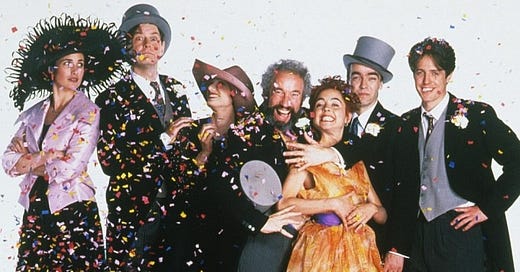Stop all the clocks
Four Weddings and a Funeral's gay plot line is more radical than I ever realised
Hello friends,
I didn’t expect ever to find myself writing an essay about a Richard Curtis film, let alone as a way of marking Pride Month, but somehow, here we are.
I’ve considered myself a non-fan of Curtis ever since I watched Love, Actually – a film I consider grotesquely offensive on almost every level, and which fills me with despair for humanity when it’s broadcast every Christmas, and people I otherwise respect refer to it using words like “classic,” “heart-warming” and “feelgood.”
(If you don’t understand what’s so terrible about Love, Actually, this 2013 article by Lindy West will run you through it. Or read this one by my brother’s podcast partner John, which I think summarises even more succinctly why it is a “horrible, toxic, retrograde dumpster fire of a movie.”)
But we’re not here to talk about Love, Actually, thank goodness. I want to tell you about the revolutionary queer moment of 1990s cinema that occurs partway through Curtis’ first big hit, Four Weddings and a Funeral, which I rewatched the other night.
Keep reading with a 7-day free trial
Subscribe to Unfinished Journeys to keep reading this post and get 7 days of free access to the full post archives.




